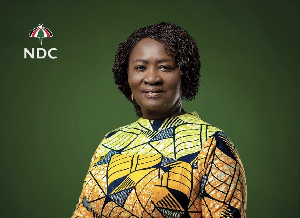 Professor Naana Jane Opoku-Agyemang
Professor Naana Jane Opoku-Agyemang
GhanaWeb Feature by: Joycelun Kyei-Baffuor
Women empowerment has been identified as one of the best and surest ways that Africa can turn around the narrative of poverty and disease.
Although the terrain is tough, several women have managed to secure the second most powerful seat in national governance – the vice-presidential slot.
Interestingly, the first African woman in this role was appointed by Yahya Jammeh in 1997 – Isatou Njie-Saidy.
As of August 2017, Africa could boast of three female vice-presidents. All three countries incidentally have ‘ia’ at the end of their names: The Gambia (West Africa), Zambia (Southern Africa), and Tanzania (East Africa).
Professor Naana Jane Opoku-Agyemang’s inclusion on the vice-presidential ticket in the 2024 general elections not only signifies inclusivity but also has the potential to inspire more women to pursue political leadership in Ghana. Her academic background and experience as a former Minister of Education add to her credibility, and if elected, her success would align Ghana with other African countries that have embraced female leadership at the highest levels.
Former President John Dramani Mahama has described his running mate, Professor Naana Jane Opoku-Agyemang, as an accomplished woman who will contribute to turning the fortunes of Ghana around. Speaking at a recent campaign tour of the Upper East Region in Bolgatanga, the leader of the National Democratic Congress (NDC) emphasized that Professor Opoku-Agyemang was picked as running mate because she was the most qualified and her credibility unblemished.
He urged Ghanaians to make history on December 7 by electing the first female Vice President of the country, adding that the decision would inspire Ghanaian girls and young women to aspire to reach the highest position in the country.
“Our women in Ghana have occupied every important position in the land. They have been Chief Justices, Directors of prisons, Speakers of Parliament, Attorneys General, Ministers, and many other roles, but the only positions women have not occupied are the two highest positions in the land, namely, vice president and president.
“Today, by the grace of God, history is about to be made. For the first time in the history of Ghana, I am convinced that on December 7, we will have a female vice president-elect, and one day a woman will be president of this country,” he said.
This trend is not new in Africa, as several countries have already broken the glass ceiling by appointing and electing women to the office of vice presidency.
The first African woman in this role was appointed by Yahya Jammeh in 1997 – Isatou Njie-Saidy. As of August 2017, Africa could boast of three female vice-presidents in The Gambia (West Africa), Zambia (Southern Africa), and Tanzania (East Africa).
Aja Fatoumata C.M. Jallow-Tambajang, a Gambian politician and activist, also served as Vice President of The Gambia and Minister of Women’s Affairs from February 2017 to June 2018 under President Adama Barrow. The 67-year-old is a pro-democracy activist who is credited as one of the key brains behind the formation of the coalition that toppled her former boss.
In Tanzania, Samia Suluhu Hassan served as vice president from 2015 to 2021, from which she ascended to the presidency following the death of her predecessor, John Magufuli. As president, Suluhu has implemented democratic reforms, reversing the policies of her predecessor that were implemented to repress political opposition. She also implemented policies to limit the spread of the COVID-19 pandemic in Tanzania, which Magufuli had denied was a serious issue. Other focuses of her presidency have included the expansion of infrastructure and the globalization of the Tanzanian economy through investors and tourism.
Inonge Mutukwa Wina also served as the 13th vice president of Zambia from 2021 to 2025 after being a legislator on two occasions, holding ministerial positions, and being the leader of the ruling Patriotic Front party.
Consequently, Aja Fatoumata C.M. Jallow-Tambajang, a Gambian politician and activist, served as Vice President of The Gambia and Minister of Women’s Affairs from February 2017 to June 2018 under President Adama Barrow. The trend suggests a growing acceptance and encouragement of women in high-level politics.
These women have made significant contributions to their countries by implementing democratic reforms and expanding infrastructure.
If Prof. Naana Jane is elected, it will place Ghana alongside these African countries and potentially inspire a new generation of women leaders in the country.
JKB/OGB
Watch the latest episode of Everyday People below:
#CelebratingUncleEboWhyte: Documentary set for release
Supreme Court judge, Justice Kulendi reveals one secret about Uncle Ebo Whyte #ExcellenceInTheatre#CelebratingEboWhyte#EboWhyteAt70 pic.twitter.com/MnRmGkayiu
— GhanaWeb (@TheGhanaWeb) August 15, 2024
